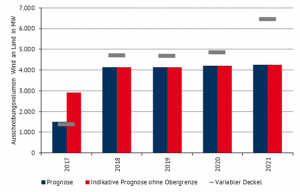The current draft for the 2016 amendment of Germany’s renewable energy law renounces the growth corridor for onshore wind power. The expansion volume will now be determined flexibly and dependent on the expansion of other renewable energies.

The expansion volume for onshore wind is calculated according to a formula, as laid down in the current draft amendment for the renewable energy law 2016 of the Federal Ministry for Economic Affairs and Energy. In addition, the remuneration of onshore wind, PV and biomass plants with a capacity of more than 1 MW will be determined via tenders. A White Paper of Energy Brainpool discusses the most important implications of the new draft:
1. Delay of expansion
The expansion of onshore wind energy in 2017 will be confined by the upper limit for net increase of onshore wind energy, which is set at 2500 MW per year. Thus the expansion of wind energy is delayed into the future.
2. Expansion volumina dependent on other renewable energies
If the expansion of other renewable energies remains below the volumes expected in the draft amendment, stronger expansion of onshore wind is required. In turn this increased expansion could be limited by the net limit for onshore wind energy. The target of a 45 percent share of renewable energies in the gross electricity consumption by 2025 might be missed.
3. Unrealistic assumption endanger the 45 % target for renewable energies
The gross electricity consumption is determined in a weighted average of the past five years. In light of the envisaged coupling of electricity, heat and mobility sectors, a more dynamic development of electricity consumption might however be expected. Also, the assumption of 2200 full load hours for newly built onshore wind energy might fall short of expectations. Both of the above would mean higher expansion volumes for onshore wind in future years. Taking the upper limit for net increase into account, the 45 % target might be at risk.
4. Net dismantling of biomass
According to the formula, a net dismantling of biomass power plant will be observed in Germany from 2016 onwards. The dismantling of those plants with high full load hours will thus have a negative influence on the share of renewable energies in the gross electricity consumption. Again, this mechanism might lead to a further increase of required onshore wind expansion volumes via tenders.



